Mali
Mali strongman Assimi Goita on Tuesday forced out two transitional leaders who had been appointed following a coup last August, and promised that elections would be held next year.
In a statement read on public television, Goita said President Bah Ndaw and Prime Minister Moctar Ouane had been stripped of their duties for seeking to "sabotage" the transition, which would "proceed as normally, and the scheduled elections will be held in 2022."
Army officers upset with a government reshuffle have detained the pair, who were appointed in September under international pressure with the task of steering Mali back to full civilian rule within 18 months.
Mali woke up Tuesday to find out that the military arrested the transitional president and prime minister overnight. This happened merely nine months after a military coup overthrew the former strongman President Ibrahim Boubacar Keita and strongly condemned by the international community.
The two interim leaders were detained Monday night after being taken by force to the military headquarters hours after a government reshuffle.
President Bah Ndaw and Prime Minister Moctar Ouane spent the night in the hands of the military, who on Monday forcibly took them to the Kati camp, a high point of the defense apparatus a few kilometers from Bamako, a source close to the military said.
No further details were provided by the source, who spoke on condition of anonymity due to the volatility of the situation.
Motivation factor
The arrests came just an hour or so after a new government Cabinet was announced. Notably, it did not include Interior Security Minister Modibo Kone or Defense Minister Sadio Camara, both junta supporters. No reason was given for their exclusion, but the move suggested mounting divisions within the transitional government.
The developments raise the new alarm about whether the transitional government will be able to move ahead freely as promised with plans to organize new democratic elections by next February in Mali, where the U.N. is spending $1.2 billion a year on a peacekeeping mission.
Previous coup
The junta had grabbed power a month earlier after mutinous soldiers encircled the home of President Ibrahim Boubacar Keita and fired shots into the air. He later resigned on national television under duress, saying he did not want the blood to be shed in order for him to stay in office.
The soldiers then went on state television calling themselves the National Committee for the Salvation of the People and promising a swift return to civilian rule. However, Monday's developments appeared to throw that promise into question.
Consistent instability
There has been widespread concern the upheaval in Mali over the past year has further set back efforts to contain militants linked to al-Qaida and the Islamic State groups.
Islamic extremists took control of major towns in northern Mali after the 2012 coup. Only a 2013 military intervention led by former colonial power France pushed extremists out of those towns. France and a U.N. force have continued to battle the extremist rebels, who operate in rural areas and regularly attack roads and cities.
Condemnations
The African Union, the United Nations, the West African regional bloc known as ECOWAS and other members of the international community called for the immediate release of President Bah N'Daw and Prime Minister Moctar Ouane, who were taken to the Kati military headquarters along with others late on Monday. The garrison town sits about 15 kilometers from the capital and is the former stronghold of the junta.
Those who signed on to the joint statement called for Mali's political transition ``to resume its course and conclude within the established timeframe.''
``"The international community rejects in advance any act of coercion, including forced resignations,'' the statement said. ``"They emphasize that the ill-considered action taken today carries the risk of weakening the mobilization of the international community in support of Mali,'' it added.
A delegation from ECOWAS will visit Bamako on Tuesday, the joint statement said.
UN Secretary-General Antonio Guterres in a tweet called Monday for "calm" in Mali and the "unconditional release" of Ndaw and Ouane.
Diplomats said the UN Security Council could hold an emergency meeting in the next few days.
A delegation from the 5-Jun Movement, the collective that led the 2020 protest against now-deposed President Ibrahim Boubacar Keita and was marginalized by the colonels, went to Kati overnight.
In mid-April, the transitional authorities announced that they would hold a referendum on October 31 on a long-promised constitutional revision and set February-March 2022 for presidential and legislative elections, after which they would hand over power to civilian leaders.
However, doubts remain about their ability to deliver, especially in the context of a renewed political crisis where jihadist and other violence continues unabated and signs of social unrest are mounting. The main union organization has just announced a new strike for this week.
Mali, a country of 19 million people, and its neighbors Niger and Burkina Faso are caught in a spiral of jihadist, inter-communal and other violence that has left thousands dead and hundreds of thousands displaced.




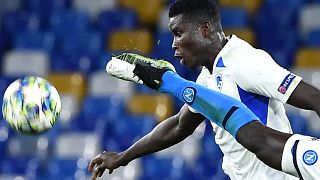
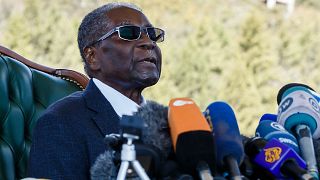
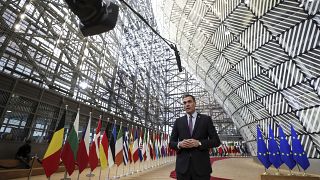
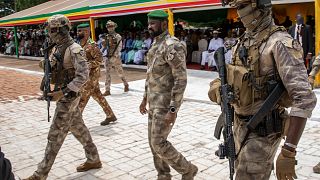
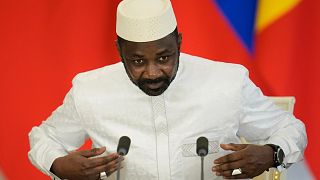




Go to video
AU names Burundian president special envoy for Sahel region
01:01
Chad’s former Prime Minister appeals to Macron after two months in detention
00:44
Mali junta chief extends army rule by five years, rules out elections
01:09
Guinea presents draft for new constitution, referendum set for September
01:00
Detained Chadian opposition leader Succes Masra ends hunger strike
01:41
UN warns of looming famine in Sudan, Gaza and 3 other global hunger hotspots